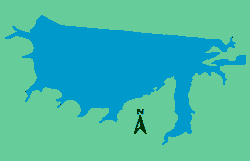Fishing
- Possession and Transport of Exotic Aquatic Species
- Licenses & Regulations
- ShareLunkers
- Fish Identification
- Fish Consumption
- Texas Freshwater Fisheries Center
Water Resources
- Texas Reservoir Levels
- US Army Corps of Engineers
- Texas Water Issues
- Golden Alga
- Aquatic Vegetation
900 CR 218
Brookeland, Texas 75931
(409) 698-9114
Dan Ashe, Biologist
Nearby State Parks
Kurth Reservoir
Quick Links: Fishing Regulations | Angling Opportunities | Cover & Structure | Tips & Tactics
Lake Characteristics
Location: Six miles north of Lufkin off
US 59
Surface area: 726 acres
Maximum depth: 40 feet
Impounded: 1950
Water Conditions
Current
Lake Level: Lake Caretaker (936) 639-4840
Conservation Pool Elevation: 197.5 ft. msl
Fluctuation: 1-3 feet
Normal Clarity: Clear
Reservoir Controlling Authority
Parks and Recreation Office
Recreation Center
516 Montrose Street
Lufkin, Texas
(936) 633-0250
Note: Lake access permits are required. Annual and 3-day permits may be purchased at the Parks and Recreation Department at 516 Montrose St.
during normal business hours (8 a.m.–4:30 p.m. Monday through Friday).
Aquatic Vegetation
Primarily hydrilla and lily pads
Predominant Fish Species
Lake Records
Stocking History
Latest Survey Report
Lake Maps
None available
Fishing Regulations
This reservoir has special regulations on largemouth bass. See bag and size limits for this lake.
Angling Opportunities
The largemouth bass population is abundant at Kurth Reservoir, with a relatively high number of fish over 4 pounds. Crappie and catfish are present, but numbers are relatively low and few anglers target these species. Bluegill and redear sunfish are present in high numbers and provide fast action, especially for youth or inexperienced anglers.
| Species | Poor | Fair | Good | Excellent |
|---|---|---|---|---|
| Largemouth Bass | ||||
| Catfish | ||||
| Crappie | ||||
| Sunfish |
Fishing Cover/Structure
Habitat in Kurth Reservoir consists of submerged aquatic vegetation (mainly hydrilla), standing timber, and lily pads. Game fish are typically found around vegetation edges, points, and creek channels.
Tips & Tactics
Kurth Reservoir has a relatively high amount of hydrilla, and anglers are successful at catching largemouth bass year round. During cooler months, fish are active for longer periods of the day; crankbaits and spinnerbaits worked over the vegetation will catch bass. During the hot summer, fish activity is usually concentrated during early morning and late evening. Topwater baits are good choices during low light conditions. As the sun rises, bass concentrate in or around vegetation edges. During this time, plastic baits and jigs fished vertically in thick hydrilla are productive.
Sunfish, especially bluegill and redear sunfish, can be caught year-round but fishing peaks in late spring or summer when fish are on their spawning beds. Small jigs, spinners, and crickets all catch sunfish.
